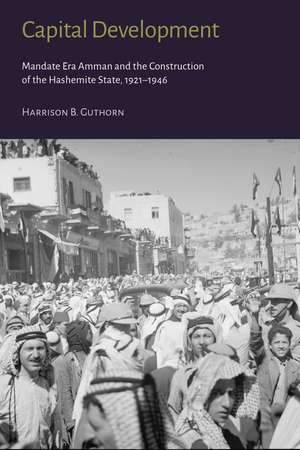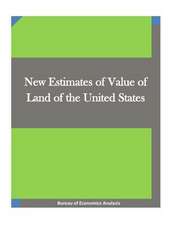Capital Development: Mandate Era Amman and the Construction of the Hashemite State (1921–1946)
Autor Harrison B. Guthornen Limba Engleză Hardback – 14 noi 2021
Amman, the capital of Jordan, contends with a crisis of identity rooted in how it grew to become a symbol for the Anglo-Hashemite government first, and a city second. As a representation of the new centralized authority, Amman became the seat of the Mandatory government that orchestrated the development of Transjordan, the British mandate established in 1921.
Despite its diminutive size, the city grew to house all the components necessary for a thriving and cohesive state by the end of the British mandate in 1946. However, in spite of its modernizing and regulatory ambitions, the Transjordan government did not control all facets of life in the region. Instead, the story of Transjordan is one of tensions between the state and the realities of the region, and these limitations forced the government to scale down its aspirations. This book presents the history of Amman’s development under the rule of the British mandate from 1921–46 and illustrates how the growth of the Anglo-Hashemite state imbued the city with physical, political, and symbolic significance.
Preț: 266.65 lei
Preț vechi: 349.65 lei
-24% Nou
Puncte Express: 400
Preț estimativ în valută:
51.02€ • 55.60$ • 42.99£
51.02€ • 55.60$ • 42.99£
Carte disponibilă
Livrare economică 02-16 aprilie
Livrare express 18-22 martie pentru 117.42 lei
Preluare comenzi: 021 569.72.76
Specificații
ISBN-13: 9781909942509
ISBN-10: 1909942502
Pagini: 272
Dimensiuni: 152 x 229 x 30 mm
Greutate: 0.5 kg
Editura: Gingko
Colecția Gingko
ISBN-10: 1909942502
Pagini: 272
Dimensiuni: 152 x 229 x 30 mm
Greutate: 0.5 kg
Editura: Gingko
Colecția Gingko
Notă biografică
Harrison Guthorn serves as a strategic leader in technology on the Education Advisory Board in Washington, DC.
Recenzii
"From private houses to a very public square, Capital Development brings vitality to a period that is often characterised as empty and waiting for socio-political life to be breathed into it. Whilst the British understood, and required, Transjordan to be a temporally stunted place and politically passive people, Guthorn brings to the foreground the lively interactions, vivacious opposition and personal feuds which shaped a nascent nation from within its emergent capital city."


















